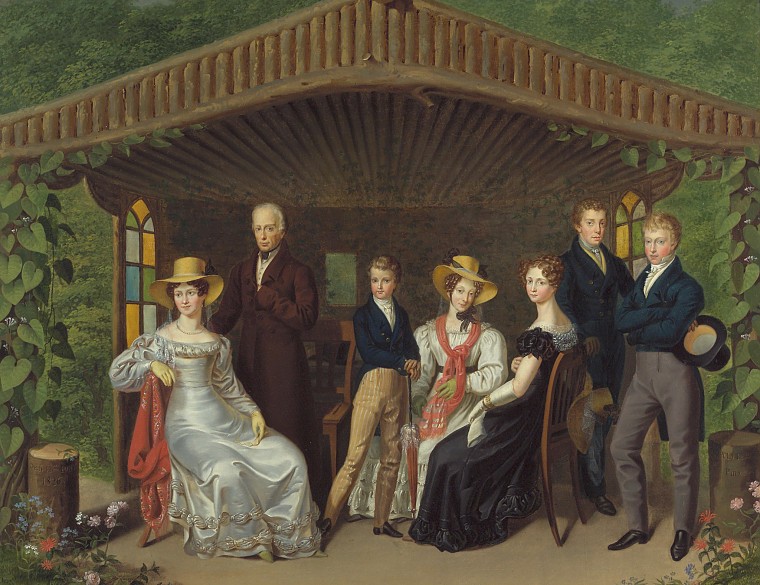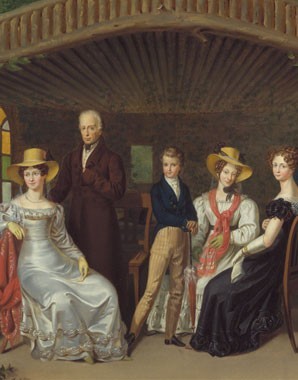Franz II (I): An upright citizen and his marriages
Emperor Franz married four times. These marriages were entered into for dynastic reasons, and some of his wives were very close relatives. Nonetheless, they developed into partnerships that were characterised by mutual trust and sympathy.
His first wife, Elisabeth Wilhelmine of Württemberg (1767–1790), was chosen for him by his uncle, Joseph II. A union with the House of Württemberg was a politically opportune choice, as Elisabeth’s elder sister Sophie Dorothea was married to the heir to the Russian throne, Paul.
The bride, who came from a Protestant dynasty, was brought to Vienna at the age of fifteen to be educated at the Convent of the Salesian Sisters in the city and prepared for conversion to Catholicism as demanded by the court. The wedding eventually took place in 1788 after a long delay, as Joseph thought Franz lacked the necessary maturity to enter the state of matrimony. Quick-witted and spirited, the young woman enjoyed an affectionate friendship with Emperor Joseph II. She died in 1790 at the age of 23 following a miscarriage, only two days before Joseph, for whom her untimely death was a final heavy blow of fate.
As heir to the imperial throne, Franz was expected to provide healthy offspring to guarantee the dynastic succession. He thus married again only six months after his first wife’s death. His second bride was Maria Teresa of Bourbon-Naples (1772–1807). Even by Habsburg standards, the couple were extremely closely related. Maria Teresa was the daughter of King Ferdinand I of Naples and Sicily and Archduchess Maria Karoline, daughter of Empress Maria Theresa. Franz was the son of Maria Luisa of Bourbon-Naples, a sister of his bride’s mother. Franz and Maria Teresa were thus first cousins on both sides. Despite this, the union was the only one of Franz’s four marriages to produce offspring, eventually resulting in a grand total of twelve children.
The marriage between the sober Franz and Maria Teresa, whom contemporary accounts describe as vivacious, seems to have been harmonious. The couple shared a deep love of music. This happy marriage ended in 1807 when Maria Teresa died from complications following a miscarriage, aged only 35. Facing huge problems ensuing from the turmoil of the wars with Napoleon, Franz had lost his most important emotional support.
His third wife was Maria Ludovika Beatrice of Modena (1787–1816), to whom he was also related. She was the youngest daughter of his uncle, Archduke Ferdinand, and the heiress to the northern Italian duchy of Modena, Maria Beatrice d’Este. Her family was driven out of their duchy by Napoleon’s troops, finding refuge in Austria, where Maria Ludovika grew up. In 1808 Luigia, as she was known in the family, was married to her cousin, Emperor Franz, who was almost twenty years her senior. The emperor was reportedly delighted by his young bride’s beauty and elegance.
Thanks to her political instincts, the young, energetic empress became an important person at the Viennese court. She was a pronounced opponent of any concessions being made to liberal forces. Maria Ludovika was adept at inspiring the patriotism of the Austrians against Napoleon. A hardliner in the struggle against Napoleon, she found it hard to stomach that her step-daughter Marie Louise had been married off to Austria’s arch-enemy.
Their marriage was however soon overshadowed when the empress contracted severe pulmonary tuberculosis. Advised against having children for reasons of health, Maria Ludovika devoted herself to the children of Franz’s previous marriage. The eldest child, Ferdinand, who was physically and mentally underdeveloped, profited in particular from her attention to his upbringing.
While on a rest cure in Carlsbad the well-read empress became acquainted with Johann Wolfgang von Goethe, on whom she made a great impression. She was apparently quick-witted and well-informed about the cultural developments of her time. In Vienna her passion for interior design made her the talk of the salons. She had her apartments at the Vienna Hofburg furnished and decorated in the latest Empire style, causing quite a stir at the imperial court, which was known for its traditional taste in furniture.
She lived to see the downfall of Napoleon and the beginning of the Congress of Vienna, although she was unable to participate because of her increasingly poor health. Maria Ludovika died in 1815 aged only 29 while taking the waters in Italy.
The emperor’s fourth and last wife was Karoline Auguste (1792–1873) from the Wittelsbach dynasty, a daughter of King Maximilian I of Bavaria. Her first marriage to Wilhelm of Württemberg had been annulled in 1815 with papal consent. The year afterwards, the 24-year-old princess married the thrice-widowed Emperor Franz, who was twice her age. When he saw his blooming young bride, Franz is alleged to have exclaimed ‘At least I won’t end up with a corpse again after a few years!’ Karolina Auguste was to outlive her husband by 38 years.
During the long years of her widowhood Karoline Auguste devoted herself to numerous charitable projects and was also an active patron of a number of cultural institutions. She kept her distance from politics, leaving the field to her far more ambitious half-sister Sophie, who married Archduke Franz Karl, one of Karoline’s stepsons, in 1824. Karoline Auguste thus became ‘step-grandmother’ to Franz Joseph, who in view of the complicated family relationships used to call her ‘Grandmother-Aunt’.













